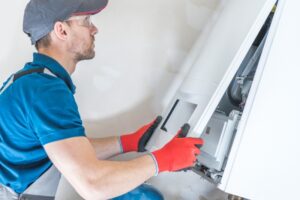One of the most commonly asked questions we get when it comes to installing a new heating system is “Which one is best for me?” There are so many options on the market today that it can seem pretty overwhelming to make choice, but we’re here to help! It first helps to choose what kind of heat you want.
What?! you might be wondering at this point… bear with us!
There are two main types of heating systems when you think about it… a forced-air system such as a furnace or heat pump, or a radiant heater such as a boiler or in-floor system. Each of these system types has its benefits, and finding the best one for your specific home and needs depends on a number of factors, which we can help you with. Read on to learn about the key differences! If you’re exploring options for a replacement, this guide on which home heating system is right for you can help you narrow down the right fit for your home’s layout and energy goals.
Furnace vs. Heat Pump: What’s the Difference?
The key difference between a forced air system and a radiant heating system is of course in their very nature. The forced air system, like a furnace or heat pump system, or even a ductless system, uses air handlers and blower fans to distribute heated air into your living space. While a radiant heating system heats up an object like your home’s flooring or a radiator, so you can feel the heat coming off of it.
Radiant heating systems function differently than forced air systems, using either water or refrigerant to transfer heat rather than utilizing air.
How to Choose the Best Heating System for Your Home
Again, this will depend on different factors. Here’s what you’ll want to consider:
1. The Lifespan of the System: Most forced air heating systems last between 10-15 years of age. That is, that’s about how long their useful lifespan is. Beyond this point, they can’t be expected to work as efficiently as they once did, you’ll need repairs more often, and all in all, you’ll be spending a lot more money from month to month to keep warm than you should be. If you’re noticing more repairs than usual, these late-season heating repair signs could be your cue that it’s time to consider a full system replacement.
A radiant heating system, however, can last for decades, especially considering what type of radiant heating system it is. That said, there’s also the geothermal heat pump, which uses the steady temperature of the earth to heat and cool your home, but can utilize air handlers. The coils and tubes of a geothermal system can last for nearly 50 years, while the external air handlers will likely need replacing more often.
2. Ductwork: If you already have ductwork installed in your home and it’s still in decent shape, then it may be best to stick with a traditional forced-air system. If, however, that ductwork has holes and tears in it that make HVAC use inefficient, it could be a good idea to consider a radiant heater, if not a ductless HVAC system. And if your furnace has been unreliable, here are furnace symptoms you don’t want to ignore before deciding whether to repair or replace your current heater.
3. Ease of Installation: One thing that should be noticed about radiant heating systems as well as geothermal heat pumps is that they’re best installed during new home construction or a remodel. They can be retrofitted into your current home, but the process is costly, and it may be more financially beneficial to go with a forced-air furnace.
At Dalton Plumbing, Heating, Cooling, Electric and Fireplaces, Inc., your comfort is our promise! To set up an appointment in the Cedar Rapids area, give us a call at the number above, email customerservice@daltonphc.com or schedule an appointment online for heating service in Cedar Rapids, IA.

